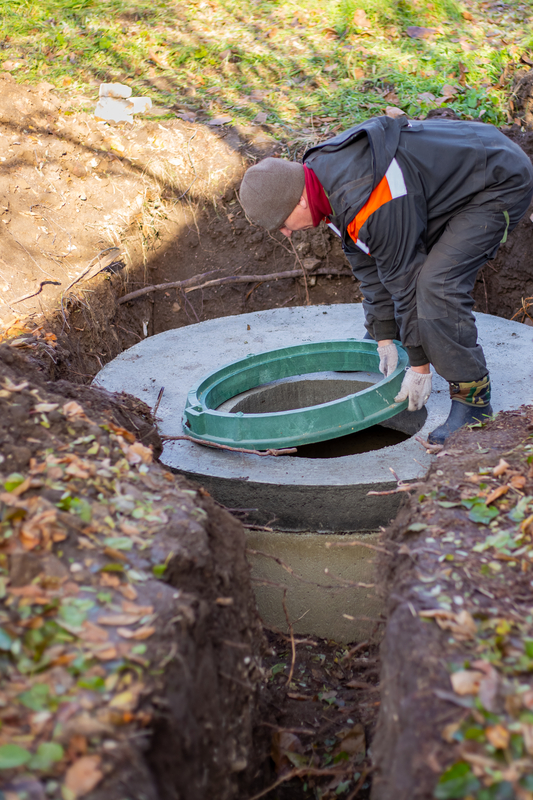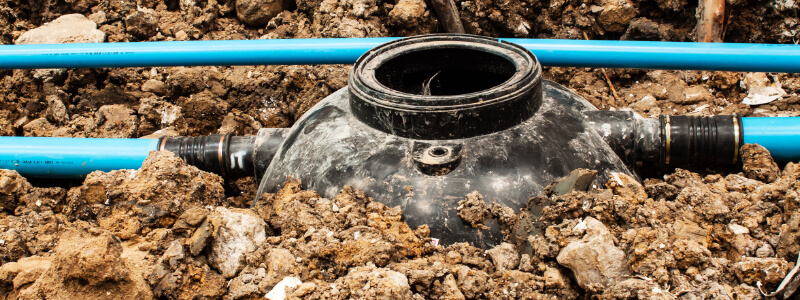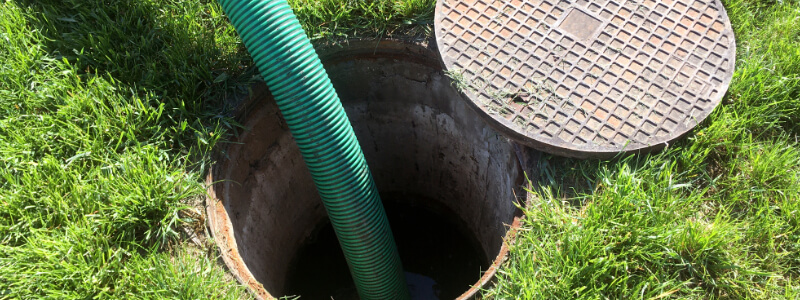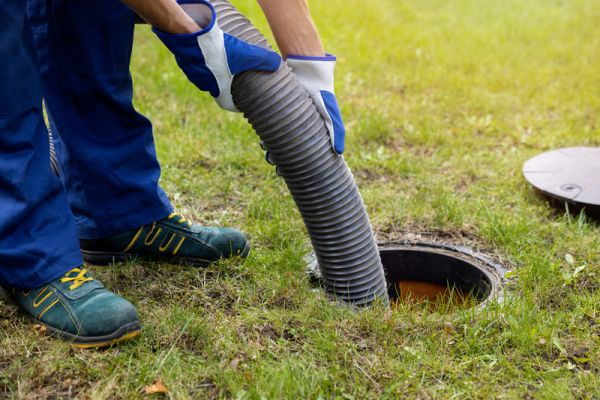In this article
What to Do If Your Septic Tank Is Full?
Maintaining a septic tank is crucial for properly functioning a household's wastewater management system. Septic tanks play a vital role in treating and disposing of household sewage in areas where centralised sewer systems are unavailable. Regular maintenance ensures the longevity and efficiency of the septic system, preventing costly repairs and environmental contamination.
In this blog post, we will discuss the essential topic of dealing with a full septic tank. A full septic tank can lead to various issues, such as slow drainage, foul odours, and potential backups, highlighting the importance of timely action and proper maintenance practices.
What is a Septic Tank?
A septic tank is a vital component of a domestic sewage disposal system commonly used in areas without a centralised sewage system. It is an underground, watertight container typically made of concrete, fibreglass, or plastic, designed to collect, treat, and disperse wastewater from homes and buildings through a drainage field (via an inlet pipe and outlet pipe).
The primary function of a septic tank is to separate solids and liquids within the wastewater. When wastewater enters the tank, solids settle at the bottom as sludge, while lighter materials like oil and grease float to the top as scum. The clarified liquid, known as effluent, exits the tank and flows into the drain field for further treatment and absorption into the soil.
The Importance of Septic Tank Maintenance
Septic tanks require routine maintenance, including regular pumping, to remove accumulated solids and prevent blockages. Proper care and maintenance are essential to ensure the efficient and safe treatment of household wastewater, protecting public health and the environment. Understanding the role of septic tanks is crucial for homeowners relying on these systems for wastewater management.
Signs of a Full Septic Tank
Several signs may manifest when a septic tank reaches capacity, indicating the need for attention and maintenance. Recognising these signs early can help prevent potential issues and ensure the proper functioning of your septic system. Here are some common indicators of a full septic tank:
Slow Draining Fixtures
-
Water draining slowly from sinks, showers, and other fixtures in the house can signify a full septic tank. This slow drainage occurs as the tank fills up and has limited capacity to process incoming wastewater efficiently.
Foul Odours Around the Area
-
Unpleasant odours lingering around the septic tank area or within the house can signal a full tank. As the tank becomes overloaded, the decomposition of waste may produce foul-smelling gases that escape into the surrounding environment.
Sewage Backups in Drains and Toilets
-
One of the most apparent signs of a full septic tank is sewage backups in drains and toilets. If wastewater starts backing up into sinks, tubs, or toilets, it indicates that the tank is at capacity and needs immediate attention.
Lush Greenery Over the Drain Field
-
Excessive plant growth or unusually lush greenery above the drain field can indicate a full septic tank. When the tank is overwhelmed, excess nutrient-rich water can reach the drain field, promoting rapid plant growth due to the increased moisture and nutrients.
Gurgling Sounds from Drains
-
Gurgling noises from drains when water is running or after flushing a toilet can signify a full septic tank. The gurgling sounds result from air trapped in the plumbing system due to the limited space in the tank for proper drainage.
By being attentive to these signs of a full septic tank, homeowners can proactively address the issue promptly and avoid more significant problems with their septic system.
So, what do you do when your septic tank is full?
Dealing with a full septic tank requires prompt action to prevent potential issues and ensure the proper functioning of your wastewater management system.
Septic Tank Pumping
Septic tank pumping is a crucial maintenance procedure that removes accumulated solids and sludge from a septic tank. Over time, solid waste and other materials settle at the bottom of the septic tank, forming a layer of sludge that must be periodically pumped out to ensure the proper functioning of the septic system.
During the pumping process, a professional septic tank service provider uses specialised equipment, such as a vacuum truck, to extract the sludge and scum from the tank. This helps prevent blockages, backups, and potential system failures by maintaining the required capacity for wastewater treatment within the tank.
Septic Tank Emptying
Septic tank emptying refers to removing all contents from the septic tank, including liquid and solid waste. Emptying ensures thorough tank cleaning, eliminating all waste materials to reset the system for optimal performance.
It typically coincides with pumping schedules to clean the tank thoroughly during maintenance.
How Emptying Works:
-
Comprehensive Cleaning: During the emptying process, solid waste and sludge are removed, and all accumulated liquids, including effluent and excess water, are also pumped out. This thorough cleaning helps reduce the risk of blockages and ensures the tank is entirely debris-free.
-
Resetting the System: Emptying the septic tank serves as a reset button for the system. Removing all contents allows for a fresh start, promoting better treatment of wastewater and preventing potential issues that can arise from residual waste in the tank.
-
Professional Service: Septic tank emptying is often performed by trained professionals equipped with the necessary tools and expertise to safely and efficiently clean the tank. These experts ensure that the tank is emptied, leaving no residue behind.
-
Enhanced Maintenance: While septic tank pumping focuses on removing solids, emptying takes maintenance a step further by addressing both solid and liquid waste. This comprehensive approach to cleaning can contribute to the longevity and effectiveness of the entire septic system.
While the terms may be used interchangeably in some contexts, septic tank pumping typically refers to removing solids. In contrast, septic tank emptying encompasses a more comprehensive cleaning process that involves clearing out all contents from the tank. Both actions are essential for maintaining a healthy and efficient septic system, with emptying offering deeper cleaning and maintenance beyond routine pumping.
What To Consider When Dealing With a Full Tank
When dealing with a full septic tank, it's essential to address the issue promptly and ensure the continued functionality of your septic system. Here are some actions we recommend to deal with a full septic tank effectively:
-
Call a Professional: Contact a professional septic tank service provider to assess the situation accurately and perform septic tank pumping. These experts have the necessary equipment and expertise to safely remove accumulated solids and sludge from the tank, restoring its capacity for wastewater treatment.
-
Avoid Harsh Chemicals: Avoid using harsh chemicals to unclog drains or address septic tank issues. These chemicals can disrupt the natural balance of bacteria in the tank, leading to potential damage. Opt for environmentally friendly and septic-safe alternatives recommended by professionals.
-
Schedule Regular Inspections: Emphasise the importance of regular inspections by certified professionals to identify issues early and prevent costly repairs. Routine maintenance can help extend the septic system's lifespan and avoid unexpected problems due to neglect.
-
Signs of Emergency: In emergencies where immediate action is required, take the following steps:
-
Minimise water usage to reduce strain on the entire tank.
-
Contact a professional septic tank service provider for emergency pumping services.
-
Keep children and pets away from areas with sewage backups to prevent health hazards.
-
Follow specific instructions provided by professionals to mitigate the emergency effectively.
-
By following these steps and seeking professional assistance when needed, homeowners can effectively deal with a full septic tank, maintain the efficiency of their septic system, and prevent further complications.

Benefits of Septic Tank Pumping
Regular septic tank pumping is essential for maintaining a healthy and properly functioning septic system. Here are the key benefits of having your septic tank pumped on a routine basis:
-
Prevents System Failures: Pumping removes accumulated solids and sludge from the septic tank, preventing clogs and blockages that can lead to system failures, backups, and costly repairs.
-
Maintains System Efficiency: By eliminating excess waste, septic tank pumping helps strengthen the capacity and efficiency of the system in treating wastewater effectively.
-
Extends System Lifespan: Regular pumping reduces strain on the septic system, prolonging its lifespan and minimising the need for premature replacements or significant repairs.
-
Prevents Odors and Contamination: Pumping out solid waste and sludge prevents foul odours from emanating around the property and reduces the risk of groundwater contamination or surface water pollution.
-
Ensures Proper Drainage: A well-maintained septic tank with regular pumping promotes proper drainage and prevents issues like slow drains, sewage backups, and soggy or flooded drain fields.
-
Protects Property Value: Maintaining a healthy septic system through regular pumping contributes to the overall value and integrity of the property, ensuring compliance with local regulations and environmental standards.
-
Cost-Effective Maintenance: Investing in routine septic tank pumping is more cost-effective than dealing with emergency repairs, system replacements, or environmental cleanup resulting from neglected septic tanks.
Maintaining Your Septic Tank
Regular septic tank pumping is essential to prevent issues like clogs, odours, overflows, and damage to the drain field. The pumping frequency depends on factors such as the size of the tank, the number of occupants in the household, and the volume of wastewater generated. It is generally recommended to schedule septic tank pumping every 3 to 5 years to ensure optimal system performance and longevity.
Proper septic tank maintenance is crucial to ensure its longevity and efficient operation. Here are essential tips to help you maintain your septic tank effectively:
-
Regular Pumping: Schedule routine septic tank pumping every 3 to 5 years, or as professionals recommend, to remove accumulated solids and prevent system issues.
-
Water Conservation: Conserve water to reduce the strain on your septic system. Fix leaks promptly, spread laundry loads, and use water-efficient fixtures and appliances.
-
Avoid Harsh Chemicals: Refrain from using chemical drain cleaners and harsh cleaning products that can disrupt the natural balance of bacteria in the septic tank.
-
Proper Disposal: Avoid flushing non-biodegradable items, grease, oil, medications, and household chemicals down the drain, as they can harm the septic system.
-
Maintain Drain Field: Keep the drain field clear of heavy vehicles, structures, and excessive plant growth to promote proper wastewater absorption into the soil.
-
Regular Inspections: Schedule regular inspections by certified professionals to check for leaks, signs of damage, or potential issues that may require attention.
-
Monitor Usage: Be mindful of your water usage habits, avoid overloading the system with excess water, and spread out activities that generate high volumes of wastewater.
-
Protect Tank Access: Ensure easy access to the septic tank for maintenance and inspection. Keep access points clear and easily reachable for service providers.
Following these maintenance tips and proactively caring for sewage tanks can prolong their lifespan, maintain optimal performance, and avoid costly repairs or system failures. Regular maintenance is vital to ensuring the efficiency and longevity of your septic systems.
Final Thoughts
When faced with a full septic tank, swift and appropriate action is imperative. Calling a professional service provider, refraining from harsh chemicals, scheduling regular inspections, and being prepared for emergencies are vital steps to address the issue effectively.
By taking proactive steps to care for your sewage treatment plant, you can safeguard your property, protect the environment, and promote the longevity and efficiency of your septic system.
For more information about septic tank systems and the types of sewage treatment plants we offer here at Cotswold Drainage, please contact a member of our team today. We're here to help you and your family achieve the perfect septic tank system.
Get in touch
Contact our friendly and professional team via form, phone or email for any drainage issues you may have.
From blocked drains to septic tank repairs and replacements, we're here to help. We have over 25 years of experience and offer 24/7 emergency callouts.
-
01386 882324
-
WhatsApp
-
This email address is being protected from spambots. You need JavaScript enabled to view it. -
See what our customers think





